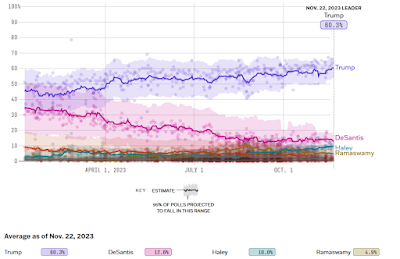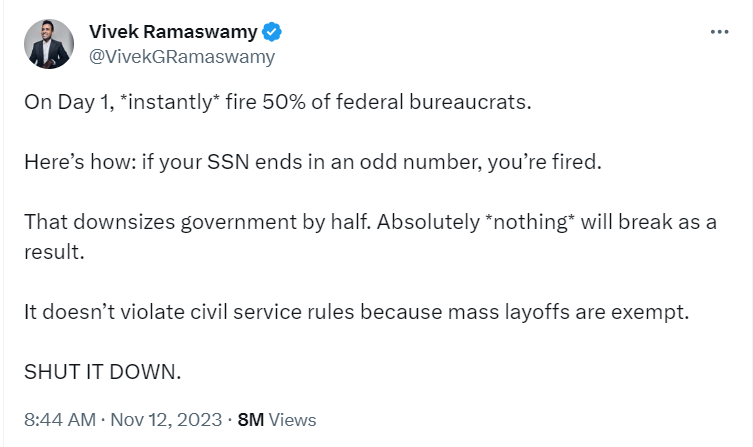Previously, I've referred to certain NYT journalists including Frank Bruni, Ezra Klein and Nate Cohn as "good soldiers." These are writers who reliably and enthusiastically toe the "pre-designated line," going a step beyond the level of compliance expected from everyone who works for the paper. With a tiny number of exceptions such as Krugman and, to a lesser degree, Jamelle Bouie, reporters and pundits may sometimes chafe at their leash, those who insist on too much independence go the way of Molly Ivins.
The article by Michael Cieply quoted below is the best explanation I've seen of NYT culture. Read it and ask yourself what kind of writer would thrive in that world.
Wednesday, November 16, 2022
The NYT's election face plant reflects a long standing problem
Michael Cieply writing in 2016. [Emphasis added.]
Having left the Times on July 25, after almost 12 years as an editor and correspondent, I missed the main heat of the presidential campaign; so I can’t add a word to those self-assessments of the recent political coverage. But these recent mornings-after leave me with some hard-earned thoughts about the Times’ drift from its moorings in the nation at-large.
For starters, it’s important to accept that the New York Times has always — or at least for many decades — been a far more editor-driven, and self-conscious, publication than many of those with which it competes. Historically, the Los Angeles Times, where I worked twice, for instance, was a reporter-driven, bottom-up newspaper. Most editors wanted to know, every day, before the first morning meeting: “What are you hearing? What have you got?”
It was a shock on arriving at the New York Times in 2004, as the paper’s movie editor, to realize that its editorial dynamic was essentially the reverse. By and large, talented reporters scrambled to match stories with what internally was often called “the narrative.” We were occasionally asked to map a narrative for our various beats a year in advance, square the plan with editors, then generate stories that fit the pre-designated line.
Reality usually had a way of intervening. But I knew one senior reporter who would play solitaire on his computer in the mornings, waiting for his editors to come through with marching orders. Once, in the Los Angeles bureau, I listened to a visiting National staff reporter tell a contact, more or less: “My editor needs someone to say such-and-such, could you say that?”
The bigger shock came on being told, at least twice, by Times editors who were describing the paper’s daily Page One meeting: “We set the agenda for the country in that room.”
Not only is the New York Times
far more committed to its narratives than are its peers, the narratives
it embraces are almost uniformly the worst possible kind: simplistic;
hackneyed; and static. Truths are obvious. Characters tend to fall
neatly into the four basic categories: hero, victim, villain, fool. A
story of scientific standards and incentives becomes a tired Scarlet
Pimpernel tale of revolutionary zealots persecuting a young woman who
overcame great hardship to learn how to dance again. A serious debate
over the best educational approaches degenerates into a black hat /
white hat fight between those who care about children and those who
simply want to pursue their own selfish ends. The enormously complex
problem of housing is reduced to a handful of trivial old money versus
new money fights about tiny pieces of land.
Add to this
arrogance, provincialism, enormous resistance to criticism, and a
tendency toward the self-serving, and you get a dangerously toxic mix.
For
the press in general, and the New York Times in particular, there is no
narrative as safe and as reassuring as Dems in disarray.The basic plot
had dust on the script back when Shirley Temple was the biggest thing in
Hollywood, it plays to comfortable notions and stereotypes, and best of
all, it hits that sweet spot for nominally center-left publications
terrified of accusations of liberal bias. (Something that conservatives
have found extraordinarily easy to take advantage of.) It appeases
critics from the right while framing the story as concerned rather than
dismissive.
"Dems in disarray" and the New York Times' other narratives and literary tics have become so predictable that the satirical New York Times Pitchbot's parody headlines often show up in the paper a few days later almost verbatim.2/2 Why, in my view, this comparison is significant:
— James Fallows (@JamesFallows) November 7, 2022
- The circumstances are as closely comparable as they can be;
- It's the same publication, same lay out, many of the same characters;
- Yet four years ago, their theme was "let's wait to see." Now "Dems in disarray."
Jeesh pic.twitter.com/F9zy5j1ZuA
How it started. How it’s going pic.twitter.com/TAJiFQ8YrT
— New York Times Pitchbot (@DougJBalloon) September 11, 2022
How it started. How it’s going pic.twitter.com/AmFfljYnN5
— New York Times Pitchbot (@DougJBalloon) January 12, 2022
Given the paper's self-importance, the satire is deeply amusing, but given its actual importance, this kind of lazy writing and even lazier journalism isn't acceptable in the paper of record.How it started. How it’s going pic.twitter.com/5JzAhcQc9E
— New York Times Pitchbot (@DougJBalloon) April 7, 2021












Dude. I'm no Musk fan, how does this excerpt show hopeless credulousness? If anything, I read weary skepticism from it. They say that Musk's assertions are premises based on claims. What more do you want? The purpose of the article from Ars is to report Musk's comments, not evaluate whether he can revolutionize tunneling. I'm sorry, would you rather they didn't report on a major tech figure's remarks? Quite a lot of people think Musk is newsworthy. How is this Ars' fault? You seem to want Ars to turn into SeekingAlpha. There are plenty of Musk fluff pieces you could have cited; choosing to focus on the Ars article makes it seem like you're just out to nitpick.
Reply